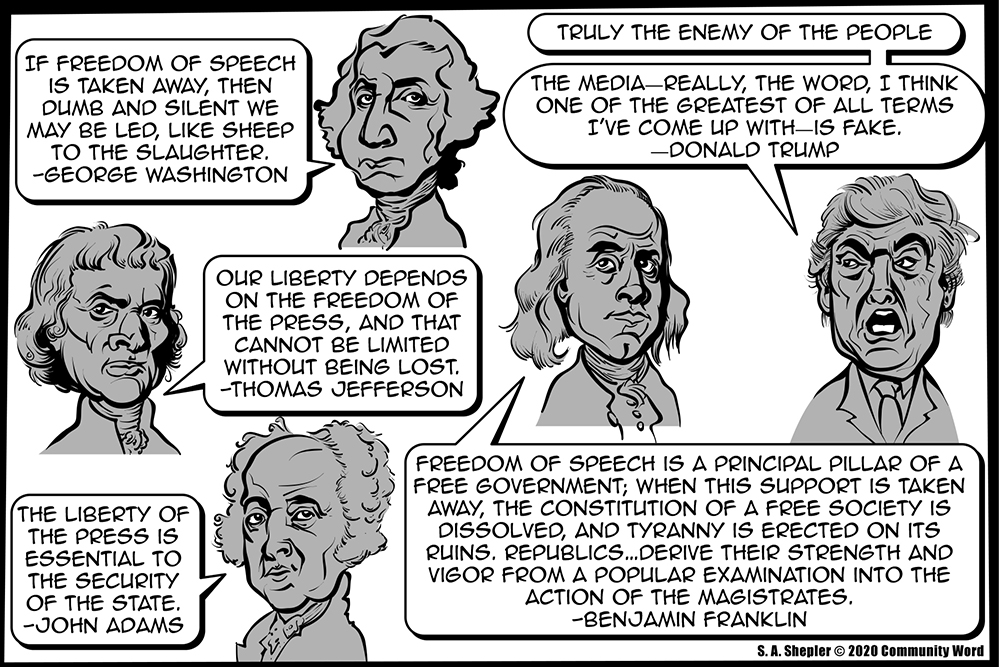
We are living in dangerous times for democracy when the press is blamed, pilloried, discredited and barred from public meetings. The national press pool is corralled in at Trump rallies as the crowd chants “Lock them up.”
That animosity has become almost standard protocol today in an atmosphere of partisan divide, anti-science dogmatism and anger.
Newspaper articles include bylines that signify a journalist or wire service is responsible for researching and reporting. Articles go through editors and copy editors. When mistakes are made, corrections are written. Facebook and other social media generally escape that level of vetting. Yet undermining newspapers continues and, discouragingly, appears in many forms and from many unexpected places.
Here is one recent example and an outstanding formal objection:
Society of Environmental Journalists Protests SBA: “No Journalists” Environmental Roundtable
The Small Business Administration announced an “environmental roundtable” Feb. 28, as being “open to all interested persons, with the exception of the press.” The Society of Environmental Journalists, through its Freedom of Information Task Force, has protested with this Feb. 21 letter:
Society of Environmental Journalists
1629 K Street NW, Suite 300, Washington, DC 20006
Phone: 202-558-2055 • sej@sej.org • www.sej.org
February 21, 2020
Major L. Clark III
Acting Chief Counsel
Office of Advocacy
U.S. Small Business Administration
409 3rd St. SW
Washington, D.C. 20416
Dear Mr. Clark:
I am writing on behalf of the Society of Environmental Journalists (SEJ) to protest your office’s efforts to exclude the press from public “roundtable” meetings that your office holds several times a year. SEJ is the world’s largest professional organization dedicated to supporting environmental journalism, with more than 1,500 members in 46 countries.
One of our journalist members recently spotted an announcement posted Feb. 10 on your website, which says the SBA Office of Advocacy Environmental Roundtable is to meet Feb. 28 in the Russell Senate Office Building. The notice says such roundtables are “open to all interested persons, with the exception of the press, [emphasis added] in order to facilitate open and frank discussion about the impacts of Federal regulatory activities on small entities.”
Similar language excluding the press is found in announcements on the office’s website of other roundtables held on other regulatory topics.
This kind of discrimination against journalists violates the spirit if not the letter of the First Amendment, which guarantees freedom of the press as well as freedom of assembly. It demonstrates a lack of transparency and a faltering commitment to open government. It may also violate the Government in the Sunshine Act, (5 U.S.C. § 552b) which says that “every portion of every meeting of an agency shall be open to public observation,” unless closure is justified by certain listed exemptions. Those include discussions of national security, personnel or trade secrets. These roundtables seem highly unlikely to touch on such matters.
David Rostker, the staff member listed as a contact in the Feb. 10 announcement, told me in a telephone conversation that the office doesn’t actually enforce the ban on journalists attending such meetings. He recalled one instance when a reporter showed up and was allowed to stay.
“It’s not as if we have any person barring the door,” he said, adding later, “We’re not throwing anybody out.”
That’s somewhat reassuring, but not good enough. By announcing your meetings are open to anyone “except the press,” you are clearly seeking to exclude journalists, who are also members of the public. That’s indisputably discriminatory.
While reporters often push back against such restrictions, declaring in writing that they are not welcome at a public meeting implies they won’t be allowed to attend. That has a chilling effect on journalists, who could decide it’s not worth the time and trouble to test the exclusion when deciding among competing priorities for pursuing news stories that day.
Mr. Rostker said the purpose of excluding the press from these meetings is to encourage members of the public to speak freely. But he also suggested that if attendees knew reporters were present, they might make speeches rather than engage in fruitful discussion.
“With all due respect to a free press,” he said, “I find the public doesn’t have conversations about solutions when there are people thinking there are quotes to be had.”
It’s naïve, though, to think anyone should expect to enjoy privacy at these meetings, or that keeping the press out will prevent grandstanding. Anybody can live-tweet or live-broadcast anything that happens at such a meeting on their smart phones, and then share it with the world via Facebook or YouTube.
The announcement says agendas and presentations are available afterward to anyone who wants them, including the press. Mr. Rostker said a list of attendees also is available upon request. That’s also insufficient.
You hold these meetings to get feedback from business representatives about federal regulations that affect them or their businesses. Clearly, you find their comments useful in your advocacy on behalf of small business to Congress and federal regulatory agencies. If businesses are reporting that regulations are affecting their operations in any way, certainly the public has a right to know — not only who’s saying that, but to assess the completeness and accuracy of what they’re telling you. By excluding the press, you cast a shadow of suspicion that these roundtables are somehow a private back door to influencing the federal government.
Accordingly, Mr. Clark, I call on you to delete the phrase “except the press” from the Feb. 10 announcement and omit it from all future roundtable notices. Let the sunshine in – you’d be surprised how little it hurts, and how helpful it actually can be.
Sincerely,
Timothy B. Wheeler, Chair, SEJ Freedom of Information Task Force
